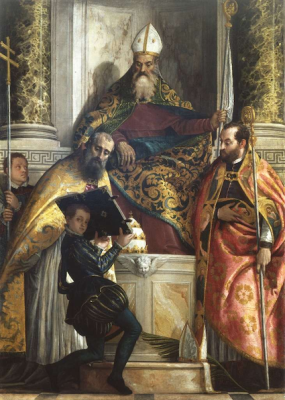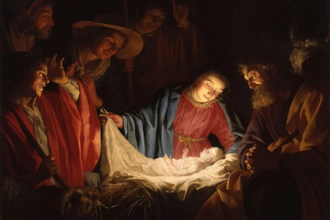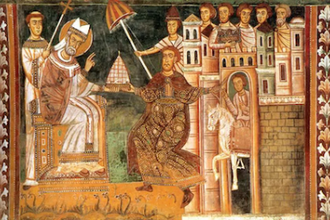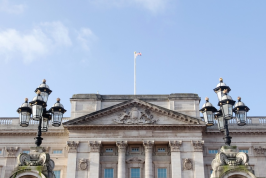Gospel in Art: Saints Pope Cornelius and Bishop Cyprian, Martyrs

Saint Anthony the Abbot with St Cornelius and St Cyprian by Paolo Caliari, known as Paolo Veronese © Pinacoteca di Brera, Italy
Source: Christian Art
Gospel of 16 September 2024
Luke 7:1-10
When Jesus had come to the end of all he wanted the people to hear, he went into Capernaum. A centurion there had a servant, a favourite of his, who was sick and near death. Having heard about Jesus he sent some Jewish elders to him to ask him to come and heal his servant. When they came to Jesus they pleaded earnestly with him. 'He deserves this of you' they said 'because he is friendly towards our people; in fact, he is the one who built the synagogue.' So Jesus went with them, and was not very far from the house when the centurion sent word to him by some friends: 'Sir,' he said 'do not put yourself to trouble; because I am not worthy to have you under my roof; and for this same reason I did not presume to come to you myself; but give the word and let my servant be cured. For I am under authority myself, and have soldiers under me; and I say to one man: Go, and he goes; to another: Come here, and he comes; to my servant: Do this, and he does it.' When Jesus heard these words he was astonished at him and, turning round, said to the crowd following him, 'I tell you, not even in Israel have I found faith like this.' And when the messengers got back to the house they found the servant in perfect health.
Reflection on the painting
Saints Pope Cornelius and Bishop Cyprian are celebrated together on 16th September because of their close friendship and shared dedication to the early Christian Church during a time of intense persecution by the emperor Decius. Cornelius served as Pope from 251 to 253 AD. His papacy was characterised by his compassionate stance towards Christians who had lapsed under persecution and had apostatised. Apostasy refers to the act of renouncing one's Christian faith, often under the threat of death or severe punishment, by publicly denying belief in Christ or participating in pagan rituals. Pope Cornelius was advocating that people who did this should be forgiven and welcomed back into the Church, rather than being given harsh punishments. Cyprian, the Bishop of Carthage, was a staunch supporter of Cornelius in this matter, and the two maintained a strong correspondence, with Cyprian defending Cornelius against schismatic movements that sought to undermine his authority.
Pope Cornelius and Bishop Cyprian remain profoundly relevant today because they championed forgiveness as a cornerstone of our Christian faith. In a world that is becoming increasingly unforgiving and, as a result, harsher and more difficult to navigate, their message is more important than ever. While calls for justice are often appropriate and necessary, we must never lose sight of the imperative to forgive, a principle that lies at the heart of our Christian faith.
Our painting shows Anthony the Great, a monk from Egypt, and contemporary of the two saints. On the left we see Saint Cornelius, and to the right Saint Cyprian. Anthony lived in Egypt as a hermit, far removed from the ecclesiastical and urban centres where Cornelius and Cyprian were active. Thus, the painting beautifully captures the profound diversity of our saints-individuals who emerged from all walks of life and embraced a wide range of vocations.
LINKS
Gospel in Art: https://christian.art/
Today's Reflection: https://christian.art/daily-gospel-reading/luke-7-1-10-2024/


















